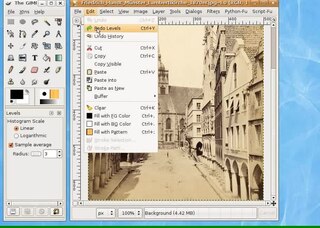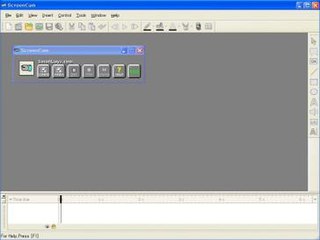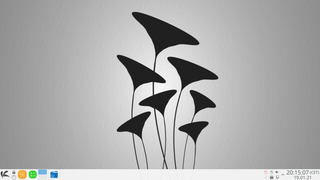
WPS Office is an office suite for Microsoft Windows, macOS, Linux, iOS, Android, and HarmonyOS developed by Zhuhai-based Chinese software developer Kingsoft. It also comes pre-installed on Fire tablets. WPS Office is made up of three primary components: WPS Writer, WPS Presentation, and WPS Spreadsheet. By 2022, WPS Office reached a number of more than 494 million monthly active users and over 1.2 billion installations.

Ubuntu is a Linux distribution based on Debian and composed mostly of free and open-source software. Ubuntu is officially released in multiple editions: Desktop, Server, and Core for Internet of things devices and robots. The operating system is developed by the British company Canonical, and a community of other developers, under a meritocratic governance model. As of October 2023, the most-recent release is 23.10, and the current long-term support release is 22.04.

A screencast is a digital recording of computer screen output, also known as a video screen capture or a screen recording, often containing audio narration. The term screencast compares with the related term screenshot; whereas screenshot generates a single picture of a computer screen, a screencast is essentially a movie of the changes over time that a user sees on a computer screen, that can be enhanced with audio narration and captions.

Xubuntu is a Canonical Ltd.–recognized, community-maintained derivative of the Ubuntu operating system. The name Xubuntu is a portmanteau of Xfce and Ubuntu, as it uses the Xfce desktop environment, instead of Ubuntu's customized GNOME desktop.

Linux Mint is a community-driven Linux distribution based on Ubuntu, bundled with a variety of free and open-source applications. It can provide full out-of-the-box multimedia support for those who choose to include proprietary software such as multimedia codecs. Compared to Ubuntu, it uses the Cinnamon interface by default, using a different, more traditional layout that can be customized by dragging the applets and creating panels. New applets can also be downloaded.

ScreenCam is a screencast tool for Microsoft Windows that is used to author software demonstrations, software simulations, branched scenarios, and tutorials in .swf format. ScreenCam was primarily targeted at users who need to create video-oriented instructional materials who were not multimedia authors or video capture technicians. It was very easy to use, having a 'VCR-like' interface and requiring no knowledge of digital video editing, or the concept of 'frames' of a movie, because it used a different paradigm for creating the screen movies. It can also be used for creation of screencasts and conversion of Microsoft PowerPoint presentations to the Adobe Flash format.
Camtasia is a software suite, created and published by TechSmith, for creating and recording video tutorials and presentations via screencast, or via a direct recording plug-in to Microsoft PowerPoint. Other multimedia recordings may be recorded at the same time or added separately. Camtasia is available in English, French, German, Japanese, Portuguese, Spanish and Chinese versions.

Ubuntu releases are made semiannually by Canonical Ltd, its developers, using the year and month of the release as a version number. The first Ubuntu release, for example, was Ubuntu 4.10 and was released on 20 October 2004. Consequently, version numbers for future versions are provisional; if the release is delayed until a different month to that planned, the version number will change accordingly.

Lubuntu is a lightweight Linux distribution based on Ubuntu and uses the LXQt desktop environment in place of Ubuntu's GNOME desktop. Lubuntu was originally touted as being "lighter, less resource hungry and more energy-efficient", but now aims to be "a functional yet modular distribution focused on getting out of the way and letting users use their computer".

SimpleScreenRecorder is a Qt-based free screencast software made for Unix operating systems, which handles similar tasks FFmpeg/avconv and VLC does.

Snap is a software packaging and deployment system developed by Canonical for operating systems that use the Linux kernel and the systemd init system. The packages, called snaps, and the tool for using them, snapd, work across a range of Linux distributions and allow upstream software developers to distribute their applications directly to users. Snaps are self-contained applications running in a sandbox with mediated access to the host system. Snap was originally released for cloud applications but was later ported to also work for Internet of Things devices and desktop applications.

Librem is a line of computers manufactured by Purism, SPC featuring free (libre) software. The laptop line is designed to protect privacy and freedom by providing no non-free (proprietary) software in the operating system or kernel, avoiding the Intel Active Management Technology, and gradually freeing and securing firmware. Librem laptops feature hardware kill switches for the microphone, webcam, Bluetooth and Wi-Fi.

KDE neon is a Linux distribution developed by KDE based on Ubuntu long-term support (LTS) releases, bundled with a set of additional software repositories containing the latest versions of the Plasma 5 desktop environment/framework, Qt 5 toolkit and other compatible KDE software. First announced in June 2016 by Kubuntu founder Jonathan Riddell following his departure from Canonical Ltd., it has been adopted by a steadily growing number of Linux users, regularly appearing in the Top 20 on DistroWatch.com's popularity tables.

Ubuntu Budgie is an official community flavor of Ubuntu. It combines the Ubuntu-based system with the independently developed Budgie desktop environment.
Ubuntu is a Debian-based Linux distribution for personal computers, tablets and smartphones, where the Ubuntu Touch edition is used; and also runs network servers, usually with the Ubuntu Server edition, either on physical or virtual servers or with containers, that is with enterprise-class features.

KaOS is a desktop Linux distribution that features the latest version of the KDE desktop environment, the LibreOffice office suite, and other popular software applications that use the Qt toolkit.

Pop!_OS is a free and open-source Linux distribution, based on Ubuntu, and featuring a customized GNOME desktop environment known as COSMIC. The distribution is developed by American Linux computer manufacturer System76. Pop!_OS is primarily built to be bundled with the computers built by System76, but can also be downloaded and installed on most computers.
CloudApp is a cross-platform screen capture and screen recording desktop client that supports online storage and sharing.

Foliate is a free e-book reading application for desktop Linux systems. The name refers to leaves, meaning "(getting) leafy" or "…-leaved".














